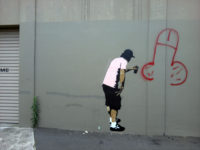You have no items in your cart. Want to get some nice things?
Go shoppingIn the changing room beneath Lex’s school, a single form repeats among the scattered graffiti, scratched into the walls and carved along the wooden benches, written indelibly on the door of his locker. The figure is so crudely rendered that it doesn’t seem right to call it by name; he sees it as more of a hammerhead with rounded tailfins, bearing at its tip a Cyclops’ eye. Just come from diving practice, Lex dries himself and is careful to remove his backpack before he puts anything wet in his locker. The bag holds his drawings, which he must preserve from water damage. An urge to look at them overtakes him, and he opens the zipper.
The central character of his comics has features copied from his school library’s illustrated Bible, though the robes have been tightened and the muscles amplified. The stories are set in Lex’s day-to-day, and in each the hero protects him from the schoolboys who defile his lunch food, who stab him with pencils and compasses, who shit and masturbate into his backpack, who leave cups of urine perched above his locker, who hold shut the door to his bathroom stall and leave as his only escape a crawl through filth, who mock his lack of experience and understanding of all things sexual, who expose themselves to him or, when he nods off in the library, lay it on his shoulder, slap it against his cheek. Lex’s defender checks as well his instinct towards trust, dissuades him from investigating when older kids tell him that surprises wait at the far end of sewer culverts, from embarrassing himself in front of the girls they say have crushes on him, or from biking down night streets when he’s invited to a party, only to find a locked door and masked assailants lying in ambush.
In most of his stories, these attacks are prevented, and he remains undamaged. In some, however, judgment is passed on those who wrong him and a punishment is exacted. For this purpose, Jesusman has three weapons: a crown of thorns which takes the flight path of a boomerang, nails that fire from his stigmata, and, of course, the scourge of small cords. At times, He unleashes a violence unparalleled since the destruction of Sodom, and even Lex is absent from the final frame, only his avenger standing above the rubble of the schoolhouse and the twisted limbs, crying Suffer little children.
Lex zips his bag. Though he is dry, he still feels the touch of the water against his skin, bringing with it memories of the pool closing over him, the rush of stillness, silence, and blue. All of the lower schoolers must join one of the junior sports teams, and he has chosen diving because of the lack of man-to-man competition, and because morning practices let out when the locker room is almost empty. He hates the place. The presence of the upper schoolers is ineluctable, their dark, almost animal odor pervading the underground halls. For Lex, at 11 years old, it is a foreign smell. And he fears most the moment he arrives at now, when he must strip down and leave himself, if only for a few seconds, exposed.
He ties the towel firmly around his waist and keens his ears. The only sound is distant laughter, a metallic echo. He reaches through the towel’s slit to untie his swimsuit. It is at his ankles when he hears voices approaching, rapid footfalls. He tries to kick loose his legs. He has to hunch and slide the suit from his feet, and when he stands they are already above him. The first boy, on his right, slams shut his locker, pinching Lex’s fingers as they reach for his clothes. The other boy jumps the bench to block Lex’s escape, and knocks the backpack to the ground. This one wears only a jock strap, the elastic digging into his skin, and has an almost inhuman face, swollen eyelids and acne scars. Though he fears for the drawings, Lex makes no motion toward them; he knows they will only remain safe if he hides his concern.
The boy facing him rips the towel from Lex’s waist and snaps it at his thigh. Lex tries to jump aside but succeeds only in throwing himself against the lockers. He reaches out to cover himself, but the boy behind him pins back his arms, leaves him exposed. The first boy spreads a sharp-edged smile. He has a broad, Roman nose, disfigured by uneven bulges, and sparse, soft hairs on his chin and upper lip. His teeth are narrow and leave gaps like black columns. He is naked. His muscles are taut, and small enough to give his body strange proportions.
Lex has ceased to struggle. He eyes the older boy’s knobby hands, large enough to close themselves around his chest. Lex’s body, unlike theirs, is free of contour, lacking both muscle and fat. And narrow, no wider than his head. His skin is smooth, pale, and unblemished. His eyes are a soft blue, and always betray his emotions.
The Roman-nosed boy, without breaking his smile, says to his partner, “See that?”
“See what?”
“Nothin much.”
“Got that right.”
“Kid’s got an innie.”
The pockmarked boy laughs like a crow cawing.
“This is the real thing.” The Roman-nosed boy takes himself in his hand and moves a step closer. Lex, whose head is barely higher than the boy’s crotch, tries to avert his face. The boy behind him twists Lex’s neck forwards, forces him to look. The underside of the shaft is showing, where branching veins entwine a dark stripe. Lex doesn’t understand the conical covering the older boy has; he thinks perhaps it is something he will grow when he matures.
The Roman-nosed boy begins to stroke himself. He hardens, and the ridged skin begins to retract. He says, “You wanna see it full on?”
Lex shakes his head.
“Nah. You wouldn’t be able to handle it.” He releases his grip, and lets himself swing back into place. “You probably don’t even know.”
He waits. Lex says nothing.
“Figures. You know how you get it growing? How you get a real one?” He runs his tongue along his gap teeth. “If you cut it off, it comes back twice as big.”
The pockmarked boy caws. “Dude! Don’t tell him that.”
The first boy brings his face close to Lex’s, only the length of his nose between them. “He doesn’t want you to know. None of them do. They wouldn’t want you to get a head start.” He sneers. “Bet you’re too pussy to try it.”
They release Lex and disappear around a corner. He races to cover himself. When their high-pitched laughter has grown distant, he runs with his backpack to the stairwell.
The idea sinks inside him, coils in his gut like a snake. Of course there would be a secret, something standing between him and manhood. Of course it would be difficult, would test his resolve. The rest of the day, he wants only not to think of it, but finds everywhere something that draws it to mind. In math class, he remembers when the teacher demonstrates how to bisect a line. Again in history, when a classmate makes a joke he doesn’t understand while their instructor lectures about uprisings. He thinks of it again during a spelling test when he stares too long at a lowercase i. Then at lunch, when the ketchup bottle reaches him near empty and splatters his tray. When he takes the first bite of his cold cuts, a whisper comes from just over his shoulder. “That’s right. Put it in your mouth. Get your tongue around it. Side to side. Yeah. Press it against your cheek. You like that. You like that, don’t you? Now swallow.”
It returns to him again during his last class of the day, religion, when the father speaks to them of Jesus hung on the cross, when Lex’s eyes stray to a painting of the crucifixion that has always haunted him, to Jesus’ sunken, upturned eyes, the trail of blood down His hollow cheek, the feeble muscles contorted and strained, the gaunt ribs traced by shadow, the naked legs twisted such that they force the thought of what they hide. Lex focuses on the weeping women at Jesus’ feet, while the father describes Him in terms so broad they leave only a frustrating blank in Lex’s mind: the life, the bread, the Word.
Lex succeeds in finding a seat to himself on the bus and returns home unmolested. His father sits at the table paying bills, with half-moon reading glasses perched on his slender nose. The walls of their apartment are bare. Lex’s father greets him and finishes with some of the papers before heading to the kitchen. He returns with oven mitts and a casserole dish of baked chicken. He takes the breasts, and leaves the wings and thighs for Lex. They make the sign of the cross. While they eat, Lex tries to think of how he could frame the question, if he could ask his father without embarrassment.
His father, between mouthfuls of meat and milk, questions Lex about his day. How was school? Fine. His classes? Fine. Any tests? No. Any quizzes? No. Diving? All right. His friends? They’re good. Any girls? No, dad. No girls? No. Much homework? Not too. Tired? Not yet. TV tonight? Lex shakes his head. No matter how he turns the phrase, he can find only words that are too vague, or too blunt to say in the presence of his father. They have never spoken of such things. He asks to be excused.
Lex brings his dishes to the sink. He slips a paring knife into his pocket and walks quietly to the bathroom. He locks himself inside. Clean porcelain shines under the cold light. A mirror runs from the window at his right, darkened by reflections, to the shower curtain opposite where a school of fish swims, spaced like the points of a grid and rendered with a naturalist’s accuracy. Lex takes the knife from his pocket and lays it on the toilet’s tank. It rests adjacent to his father’s razor. He sits on the toilet and removes his shoes and socks. He takes off his pants and folds them, does the same with his shirt, and finally his underwear. He places these in a stack by the door. The blue tiles are cold against his feet. He turns to face the mirror.
Though a feeling rises from his sacrum, tightens its grip on his stomach and weighs against his head, he forces himself to picture it. Taking the head with his left hand, drawing himself out, and then the stroke – would it be a single, clean division? What if he lacked the strength, if the flesh proved tough as overcooked meat? Perhaps he should have taken a serrated blade. But then, what if he faints, makes it only half way? And he hadn’t thought of the blood; he’ll have to keep his school uniform clean, and above all hide the traces from his father. What if, rather than a flow, the blood is more of a spray or mist? He takes a towel from the rack and folds it in thirds.
The thought arises that he might be misleading himself, that the Roman-nosed boy’s words, if you cut it off, it comes back twice as big, may have been a lie. How could he be certain? The boy said others would want to keep this knowledge from him. Lex tries to reason; perhaps he is like a lizard that, detaching its tail to escape a predator, can always grow another. But so far as he knows, for the lizard, the new growth does not increase in length. What if he is more like an earthworm? If, once separated, the other half takes on a life of its own, can float or flop about and expose to the world his lack? But another phrase returns to him: Bet you’re too pussy to try it. His doubts are merely cowardice. Just like his hair, his nails. He is a meat grinder; it continues to well up in him, to fill new casings.
The door opens. Lex keeps his eyes closed as he hears the lock refastened, feels the other presence approach behind him. The figure is different from Lex’s drawings, narrow and elongated, far taller than Lex imagined. In the mirror, Lex can see only His torso; what lies above the neck and below the waist remains outside the frame. A slit lies open along His ribs, from which blood trickles. He places His hand on Lex’s shoulder. The grip is wet from the wound in His palm. Lex finds the courage to speak. Is it true, he asks, do you cut it? The voice that responds is low and heavy, yet quiet. “Yes.” He says. “We all do, and I most of all. I break my flesh every Sabbath, and it has grown long and firm enough that I can lower it like a rope from heaven, and raise the downtrodden to me.”
Lex nods. He is alone again in the room. He knows what he must do, thinks of it as his revenge against everyone who has humiliated him. As though this would be the step across the barrier he faces every time someone taunts him for his misunderstanding of what he knows must be something sexual. Laughing as they repeat, You don’t know about… Never heard of… The power they gain in this way attaches itself in Lex’s mind to the words themselves, terms and phrases that he researches but that remain still impenetrable, with meanings referencing always another obscure object and names he can never imagine speaking aloud. That same sense of mystery imposes itself whenever he is faced with the thing itself, as he is now.
He thinks of the act accomplished. After the regrowth, or perhaps after two or three (he will not be too greedy), he imagines something thick enough to forever mark its contour along his pants leg, something no amount of modesty could hide. It would take control of any woman who saw it, older, beautiful women, who would lead him wordlessly to a bathroom or closet and who, without his needing to make any advances or even any movement, would initiate him.
He opens his eyes. He takes the knife by its ridged hilt and, with the towel in his left palm, lays himself on the white cloth. He pinches his head through the fabric. The skin grows a shade paler. He pulls gently to lengthen the shaft. He read once that because a man only ever sees his own from the top down, it appears smaller to oneself than to others. He takes solace in this. He rotates it slightly, turns the cloth left then right. Dark curves furrow the skin. Like the moment before a run down the diving board, the anxiety forms a wall he can only peer over. He continues to stare down at himself, knowing he’s not man enough for the next step.

About Jonathan Basile
Jonathan Basile is a fiction writer, philosopher, and computer programmer. He is the creator and webmaster of an online universal library modeled after Borges’ “The Library of Babel,” libraryofbabel.info, and a universal image archive. His non-fiction writing has been published in The Paris Review Daily, Flavorwire, and Nexos. His work has been exhibited at Recess Art, Good Work Gallery, and Trestle Gallery.




